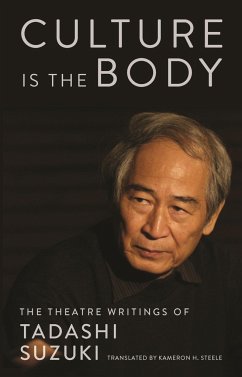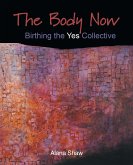Schade – dieser Artikel ist leider ausverkauft. Sobald wir wissen, ob und wann der Artikel wieder verfügbar ist, informieren wir Sie an dieser Stelle.
- Broschiertes Buch
- Merkliste
- Auf die Merkliste
- Bewerten Bewerten
- Teilen
- Produkt teilen
- Produkterinnerung
- Produkterinnerung
Legendary theatre director Tadashi Suzuki explains his revered approach in this complete revision of his writings.
Andere Kunden interessierten sich auch für
![Exposed by the Mask Exposed by the Mask]() Peter HallExposed by the Mask16,99 €
Peter HallExposed by the Mask16,99 €![Theater for Beginners Theater for Beginners]() Richard MaxwellTheater for Beginners12,99 €
Richard MaxwellTheater for Beginners12,99 €![Advice to the Players Advice to the Players]() Robert LewisAdvice to the Players15,99 €
Robert LewisAdvice to the Players15,99 €![The Art of the Actor The Art of the Actor]() Jean BenedettiThe Art of the Actor56,99 €
Jean BenedettiThe Art of the Actor56,99 €![The Body Now The Body Now]() Alana ShawThe Body Now22,99 €
Alana ShawThe Body Now22,99 €
Legendary theatre director Tadashi Suzuki explains his revered approach in this complete revision of his writings.
Produktdetails
- Produktdetails
- Verlag: Theatre Communications Group
- Seitenzahl: 192
- Erscheinungstermin: 4. August 2015
- Englisch
- Abmessung: 235mm x 146mm x 20mm
- Gewicht: 364g
- ISBN-13: 9781559364966
- ISBN-10: 1559364963
- Artikelnr.: 41620627
- Herstellerkennzeichnung
- Libri GmbH
- Europaallee 1
- 36244 Bad Hersfeld
- gpsr@libri.de
- Verlag: Theatre Communications Group
- Seitenzahl: 192
- Erscheinungstermin: 4. August 2015
- Englisch
- Abmessung: 235mm x 146mm x 20mm
- Gewicht: 364g
- ISBN-13: 9781559364966
- ISBN-10: 1559364963
- Artikelnr.: 41620627
- Herstellerkennzeichnung
- Libri GmbH
- Europaallee 1
- 36244 Bad Hersfeld
- gpsr@libri.de
Tadashi Suzuki is the founder and director of the Suzuki Company of Toga (SCOT) based in Toga Village, located in the mountains of Toyama prefecture. He is the organizer of Japan’s first international theatre festival (Toga Festival), and the creator of the Suzuki Method of Actor Training. Suzuki also plays an important role with several other organizations: as General Artistic Director of Shizuoka Performing Arts Center (1995~2007), as a member of the International Theatre Olympics Committee, as founding member of the BeSeTo Festival (jointly organized by leading theatre professionals from Japan, China and Korea) and as Chairman of the Board of Directors for the Japan Performing Arts Foundation, a nation-wide network of theatre professionals in Japan. Suzuki’s works include On the Dramatic Passions, The Trojan Women, Dionysus, King Lear, Cyrano de Bergerac, Madame de Sade and many others. Besides productions with his own company, he has directed several international collaborations, such as The Tale of Lear, co-produced and presented by four leading regional theatres in the US; King Lear, presented with the Moscow Art Theatre; Oedipus Rex, co-produced by Cultural Olympiad and Düsseldorf Schauspiel Haus; and Electra, produced by Ansan Arts Center/Arco Arts Theatre in Korea and the Taganka Theatre in Russia. Suzuki has taught his system of actor training in schools and theatres throughout the world, including The Juilliard School in New York and the Moscow Art Theatre. The Cambridge University Press published The Theatre of Suzuki Tadashi as part of their Directors in Perspective series, featuring leading theatre directors of the 20th Century. This series includes works on Meyerlhold, Brecht, Strehler, Peter Brook and Robert Wilson among others. Not just one of the world’s foremost theatre directors, Suzuki is also a seminal thinker and practitioner whose work has a powerful influence on theatre everywhere. Suzuki’s primary concerns include: the structure of a theatre group, the creation and use of theatrical space, and the overcoming of cultural and national barriers in the interest of creating work that is truly universal. Suzuki has established in Toga one of the largest international theatre centers in the world. Surrounded by the beautiful wilderness of Toga, the facility includes six theatres, rehearsal rooms, offices, lodgings and restaurants, etc. Suzuki’s activities, both as a director creating multilingual and multicultural productions, and as a festival producer bringing people from throughout the world together in the context of shared theatrical endeavor, reflect an aggressive approach to dealing with the fundamental issues of our times. Kameron Steele is an American actor, director and teacher. After receiving his BFA in Performance Studies from Northwestern University in 1991, he joined Tadashi Suzuki's SCOT company in Toga, Japan, appearing in King Lear , Ivanov, Dionysus and Greetings from the Edge of the Earth, among others. From 1998-2008 Steele also worked extensively with Robert Wilson, appearing in Persephone, Woyzeck, The Days Before and the title role in Prometheus. As director he has presented works in NYC at HERE, PS122, PRELUDE, LMCC, The Public, as well as on tour in Argentina, Mexico, Belgium and Spain. Steele has translated and/or adapted several works by Japanese authors including Yukio Mishima, Shuji Terayama, Kobo Abe, Masataka Matsuda and Mikuni Yanaihara. He also created the English subtitles for Soda Kazuhiro's landmark documentary films Senkyo (Election) and Engeki ( Theatre). In 2014, Steele received his MFA in directing from the California Institute of the Arts. He currently leads the Suzuki Method of Actor Training Program in Toga.






